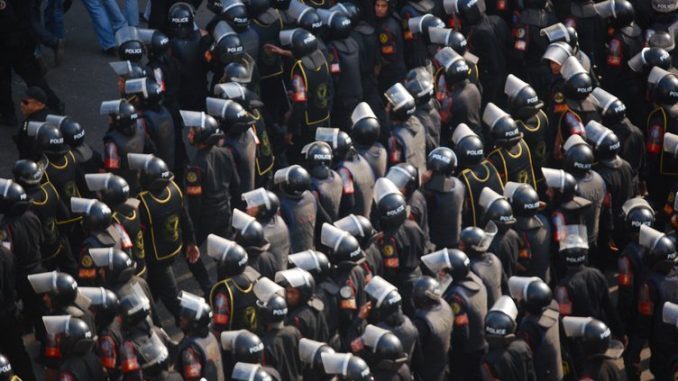
Why is Egypt in its current state? And what happened to the revolution? These two questions and many others were addressed by Open Democracy in an interview with Joshua Stacher about his new book, “Egypt’s Watermelon Democracy – Egypt’s Turbulent Transition”.
In 2019, Egypt witnessed a new wave of protests against the Sisi regime. Every year, new literature emerges that tries to understand Egyptian politics after the revolution and why it reached its current state. In 2011 Joshua Stacher, associate professor of political science at Kent University State went on a journey to understand the central aspects of Egypt‘s uprising and transition.
In his new book, “Watermelon Democracy: Egypt’s Turbulent Transition” published with Syracuse University Press in Spring 2020, Joshua Stacher examines why Egypt is in this current state examining the election, economy, the military and of course state violence.
Tugrul Mende, based in Berlin as a project coordinator and independent researcher, conducted this interview with Joshua Stacher via Skype and asked him about his new book, revolutions, uprisings, and how to find a way to understand them.
TM: Let‘s start with the very beginning, when did your interest in Egypt start to emerge?
JS: When I was 21 years old I went on a study abroad program through my university. One of these places was Egypt. I fell in love with Cairo immediately because it was the most fascinating place I had ever seen and I decided to move there and did a Master Degree at the American University in Cairo. I learned Arabic and ended up living in Cairo for about nine years, between 1998 and 2007. Being there that long gave me a lot of time to get comfortable with the different political perspectives and different groups. I would spend a little bit of time dealing with protestors, revolutionaries, socialists, the Mubarak regime, the National Democratic Party and the Muslim Brotherhood. I produced a book comparing authoritarianism in Egypt and Syria which came out in 2012 called “Adaptable Autocrats”.
In December 2010 and January 2011 I was looking for a new project. The uprising happened. It just made sense, given my long commitment to, and experience with Egyptians, so I produced this book called “Watermelon Democracy.”
TM: What made you write this book?
JS: Essentially, a lot of people were asking the question: “What did we see in 2011? Was it a revolution? And If it not, why not?” As things started to go sideways and the military started to perform its coup d’etat in 2013, getting rid of a democratically elected president, I watched a bunch of people in the United States but also in Europe start to make arguments about how this was the fault of the protestors, saying “It was their fault, they weren’t ready. They weren’t organized, their politics was dangerous.” That was utterly different from what I was seeing on the ground. I was concerned with how this was portrayed in the United States. There were a lot of people at Think Tanks that were basically not examining the Egyptian experience and prioritizing the United States or European Union interests over Egyptian demands of freedom and better Economic opportunities.
I decided that I was going to write my book from a perspective that centered around the broad demands the protesters were asking for and what response this produced from a collapsed regime and fragmenting state apparatus. There were people we can blame for why the transition went the way it did and they all wear military uniforms and go by the title of general or field marshall. I was not willing to spread blame around because in my sense the military was disproportionately in power throughout this process, and they were disproportionately responsible of how it turned out. The other thing that made me write it this way was that other political scientists dove back into books about transition literature about Latin America, Southeast Asia, and Eastern Europe. I was really looking at these works with fresh eyes for the first time because they were finally applying them to a case that I felt I understood pretty well. Everything seemed to be very linear.
I decided to write a book that wasn’t chronological, telling a story of the Egyptian uprising.
Everyone seemed to be looking for a sole cause or reason for why transitions unfold the way they do. My lived experience as a researcher was completely different. There were times when I would go and it was about protesters, other times it would be elections or the economy. One thing that glued it all together was the explosion of state violence. I decided to write a book that wasn’t chronological, telling a story of the Egyptian uprising but looking at different pieces of that story and how those fit into a grander narrative of how Egypt’s revolution was basically crushed and stopped.
TM: When did you decide to completely focus on Egypt instead of comparing it to Syria again?
JS: I wanted to write a book about Egypt since the Summer of 2011. I always felt more comfortable with my networks and my contacts in Egypt. I lived there for so long. I lived in Damascus only for about eight months. I never really felt comfortable with what I was seeing and what I was understanding. I felt with Egypt that I had more networks that could help me position what I was seeing. I had connections all over the place. It made a lot of sense because I had strong relationships with so many actors. I am still able to talk with them, I felt the thing that I could do best was write about Egypt and try to make sense of it. That’s what I did.
TM: Do you think it is becoming more difficult to navigate as an academic in Egypt?
JS: I am a member on the Middle East Studies Association’s active Committee on Academic Freedom. The defining case on academic research in Egypt was when the Egyptian security forces murdered Giulio Regeni in January 2016. I went to Egypt two weeks after his body was found. There were many debates about this case whether it was safe for people to go. I felt at that time that my physical presence in Egypt was a symbol or a signifier to Egyptians that we haven’t forgotten them. We are still coming. We are still going to be in solidarity even if we can’t work there anymore as we used to. I think that Egypt is dangerous for academics that are working on contemporary politics, the military, the economy, and protests. These are calculated risks. The risks that I assume going to Egypt and working on the country’s politics are much less than the people who are putting their body on the line. This is just a minor way of expressing solidarity through research.
One thing that I noticed as a researcher is the restriction on my mobility in the country. For example, the idea of going to Mahalla Kubra and doing research with people who work in the factory seems almost like an impossibility. It was hard before the revolution, and now I think it endangers many people. I do not want to be responsible for getting someone in trouble with the state.
TM: What difficulties did you find in writing this book?
JS: I looked at books that I really appreciated or really taught me a lot. I studied the structure of the books. What I really wanted to do was an extended mediation on incumbent protestor relationships, elections, state violence, and a political economy of an uprising. You can read these things in or out of order. Once you read the whole book, you get a wider picture of how Egypt turned out in its current state.
I don‘t actually think that the Sisi regime is the regime, it is a collection of people using a gross amount of state violence in order to maintain their precarious position. Whatever Sisi is running is a shadow of a clunky state machine that Husni Mubarak used to run. I think that is why I picked the topic of state violence. I was shocked about how little focus there was on state violence. Everybody who write on Egypt talk about human rights violations or some sort of repression. The unleashing of state violence on Egyptian bodies deserved it’s own time in the book to reflect on. I thought that this chapter on state violence was going to be the hardest chapter to write, in some ways it was. You think about what happened at Rabaa Square in August 2013. And, yet, the most depressing chapter to write was the political economy chapter because in that chapter I realized that reform is not really an option in Egypt. Egyptians are trapped. The system has to be overthrown and sort of redesigned.
The Egyptian state is now coming to the point where it treats its citizens that are asking questions as combatants in a war.
Egyptians are in a deathtrap in that political economy. All it does is produce diminishing quality of life and increasing numbers of bodies that want to come out to the street to air their grievances. The Egyptian state is now coming to the point where it treats its citizens that are asking questions as combatants in a war. I think that political economy and state violence, are the enduring cycle that Egyptians have to change. What I can do is bring this to the spotlight and amplify Egyptian voices rather than speak for them.
TM: In your book you are using a lot of transition literature, how are they useful for the Egyptian case?
JS: I think there are severe limitations in the terminology used in the transition literature. I’m not saying that Egypt speaks for every other case, I am saying that there are lessons we can learn from Egyptians to think about these important moments of upheaval in different ways. I was very interested in letting Egypt speak and put a framework so that other academics could understand.
I don’t think that other Egyptians will read my book and be shocked about what I found out because by and large the story emerges from the things that they shared with me. I think that the book’s real impact is for the people who are thinking about moments of upheaval, revolutions, transitions and uprisings. When we look at Sudan, Algeria or Iraq, right now, what did Egypt teach us about these kinds of moments? It is clear that Algerians, Sudanese and Iraqis are looking at Egypt, Syria and Libya and also adapting their models. We are living through this experience. My body is never really in danger and I have protections. I have to put something out in the world that amplifies the people who are putting themselves in danger.
TM: There are opinions that the revolution is still not over, and it is all a process. What are your thoughts about this?
JS: What we witnessed in 2011 was a historical process. We have to respect and understand this. What we have been watching is one large historic struggle that is more a process than an outcome. Most of the political science that I read wants to look at it as outcome.
I don‘t want to label it as a success or failure, I want to understand it as a process because it’s not over. Somewhere in the book I make the point that what we just watched is setting a historical stage for the next interaction. The one nice thing about history is that we know there is only one rule: nothing stays the same.
TM: There are protests that erupted recently, do you think they are connected to 2011?
JS: I think there are no close relationships with the protests in 2011. This is partially because of violence, and the repression that we have seen over the last eight years, and particularly since 2013, which is the most repressive era in Egyptian history. I am sure these protestors are more cynical, and they are a lot more battle tested. People have gone to prison and to exile. They can’t function in this repressive Egypt. Ultimately, when we are talking about how the protests of 2019 are connected to 2011, the thing that stands out is the overall fragmentation of Egypt‘s state. What Sisi is trying to do is to build a regime on the ashes of the older order that has already been discredited. Sisi’s violent circus act can barely withstand any social pressure. The economy and social repression is going to produce more social revolt but I don’t know what form it will take.
TM: How was Ganzeer involved in the current book?
JS: I had this idea of a picture of Tahrir and then somebody draws a helicopter and drops a watermelon on the crowd. I texted one of my friends and comrades Elliott Colla, and told him that I have this idea about a book cover. He listened, then called me, and told me: “I have a better idea, let Ganzeer do this.”
He put me in touch with Ganzeer, and we had a couple of conversations on the phone and discussed the arguments of the book. He read some of it and we worked together on it. But it was all Ganzeer’s vision and artistic creativity. I had to negotiate the title and the cover with every publisher that I was dealing with. Both the first publisher that I approached, and Syracuse were hesitant about the cover and the title, but Syracuse became more comfortable and is now very excited that we called it “Watermelon Democracy.” It’s an honor and privilege that Ganzeer did the cover because it really speaks to keeping Egyptians centered in this research. I wanted it to be grounded in Egyptianness as much as possible. Most non-Egyptians get a puzzled look when they read the title, but every single Egyptian that I have told the title to immediately does the translation into Arabic in their head and starts to giggle and laugh. The literature behind these topics are an open-ended process. I try to keep my analysis open to those possibilities.



